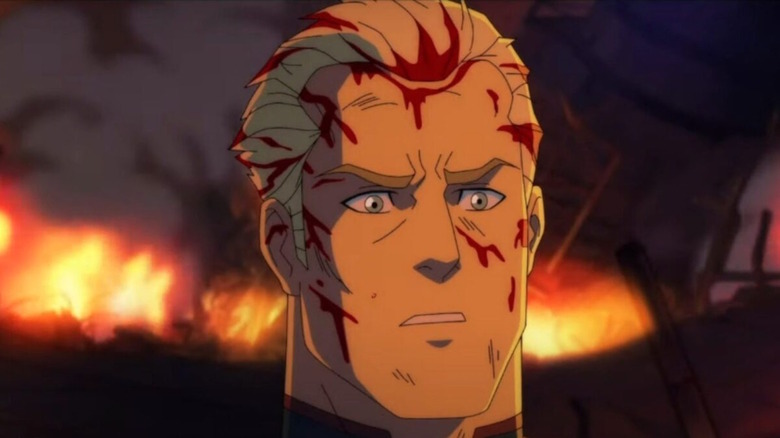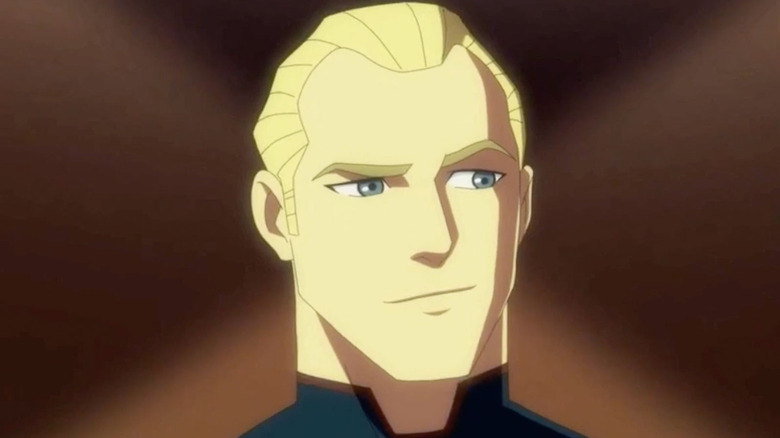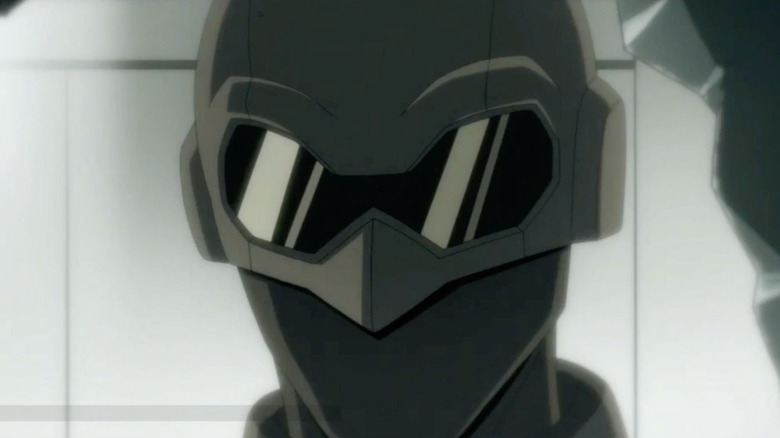The Ending Of The Boys Presents: Diabolical Explained
Contains spoilers for "The Boys Presents: Diabolical"
While the spin-off series to Amazon's Emmy-nominated, no-holds-barred superhero show "The Boys" is more of an anthology series, that's not to say "The Boys Presents: Diabolical" doesn't share some links to the series we know, love, and keep at arm's length for our own mental health. In the final episode of the new series, the spotlight lands on the most-feared individual in the universe of "The Boys." It's an origin story of sorts, but not the kind you've come to expect. This is the origin story of how Vought's most powerful superhero broke bad to become the sociopath we tune in to watch on the flagship show.
The final episode, entitled "One Plus One Equals Two," highlights the origins of Vought's poster boy and how he made his way into The Company alongside another iconic figure from The Seven, Black Noir. While the original series may have skimmed over the origins of the star-spangled psychopath, here we get much greater insight into how — even in his early days of playing hero — the dark side was waiting to break free within Homelander (voiced by Antony Starr).
More importantly, it shows how he needed a little help from his friends along the way to becoming an all-world heel.
Homelander once had a soul ... probably
"One Plus One Equals Two" really displays a Homelander who's rough around the edges and naïve to the organization he's one day going to become the poster boy for. Incredibly, it also shows that — at least early on in his career — this monster might have actually meant well. How's that for a twist?
During the press conference that sees him signing up with Vought and getting paired up with "psycho mute" Black Noir, it feels like the soon-to-be serial killer in a cape is a far cry from the deranged hero he'll eventually become. Okay, sure, it's hard to ignore the flickers of his traumatic childhood as he's giving a speech comparing Vought to the Yankees, but we all know what this guy's going to become, so we're fresh out of sympathy just now.
Homelander's journey in Act I of the final episode of "Diabolical" feels more than a bit like Steve Rogers' patriotic tour in "Captain America: The First Avenger" — except it doesn't quite end in the same place.
The beginning of a beautifully grotesque friendship
In the first two seasons of "The Boys," Black Noir has been both a sliver of physical comedy and a terrifying force to be reckoned with. What's most interesting, though, is how often Homelander has been quick to speak for and often defend his masked teammate. As a result, it makes it all the more surprising that this short animated episode reveals the two weren't necessarily on speaking terms (pardon the pun) when Homelander joined the ranks alongside him.
Tweaking the classic comic book trope of heroes going from enemies to friends works brilliantly here in the twisted territory of "The Boys." By the end of the episode, it's clear that Homelander is headed down a dark and deluded path that we know he'll never come back from, and Black Noir is right there with him. Basking in the media's praise from a failed mission and referring to the hostages as "the real heroes" feels like the same scam he pulled following many other foul-ups he and The Seven have been linked to on "The Boys."
As great as it's been seeing the early years of Homelander, there are plenty more interesting stories to tell in this form that could help us fill in some of the blanks from the flagship series. If another dose of "Diabolical" gets greenlit, could we perhaps see Homelander and his visits to Billy Butcher's late wife, Becca (Shantel VanSanten), before Butcher learned she was still alive. And what about the backstory between Homelander and the rest of The Seven? Clearly there's something there — especially with Queen Maeve.
We can only wait and be very scared to see.


